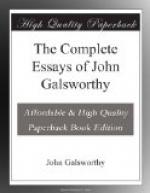sympathetic, rather diffident, speculative, moderately
intelligent, with the rudiments perhaps of an imagination.
And he looked at the second man, who was sitting
very upright, as if he had a particularly fine backbone,
of which he was not a little proud. He was extremely
big and handsome, with pronounced and regular nose
and chin, firm, well-cut lips beneath a smooth moustache,
direct and rather insolent eyes, a some what receding
forehead, and an air of mastery over all around.
It was obvious that he possessed a complete knowledge
of his own mind, some brutality, much practical intelligence,
great resolution, no imagination, and plenty of conceit.
And he looked at the woman. She was pretty, but
her face was vapid, and seemed to have no character
at all. And from one to the other he looked,
and the more he looked the less resemblance he saw
between them, till the objects of his scrutiny grew
restive.... Then, ceasing to examine them, an
idea came to him. “No! The Public
is not this or that class, this or that type; the
Public is an hypothetical average human being, endowed
with average human qualities—a distillation,
in fact, of all the people in this hall, the people
in the street outside, the people of this country
everywhere.” And for a moment he was pleased;
but soon he began again to feel uneasy. “Since,”
he reflected, “it is necessary for me to supply
this hypothetical average human being with what he
wants, I shall have to find out how to distil him from
all the ingredients around me. Now how am I to
do that? It will certainly take me more than
all my life to collect and boil the souls of all of
them, which is necessary if I am to extract the genuine
article, and I should then apparently have no time
left to supply the precipitated spirit, when I had
obtained it, with what it wanted! Yet this hypothetical
average human being must be found, or I must stay
for ever haunted by the thought that I am not supplying
him with what he wants!” And the writer became
more and more discouraged, for to arrogate to himself
knowledge of all the heights and depths, and even
of all the virtues and vices, tastes and dislikes
of all the people of the country, without having first
obtained it, seemed to him to savour of insolence.
And still more did it appear impertinent, having
taken this mass of knowledge which he had not got,
to extract from it a golden mean man, in order to
supply him with what he wanted. And yet this
was what every artist did who justified his existence—or
it would not have been so stated in a newspaper.
And he gaped up at the lofty ceiling, as if he might
perchance see the Public flying up there in the faint
bluish mist of smoke. And suddenly he thought:
“Suppose, by some miracle, my golden-mean bird
came flying to me with its beak open for the food
with which it is my duty to supply it—would
it after all be such a very strange-looking creature;
would it not be extremely like my normal self?
Am I not, in fact, myself the Public? For,




